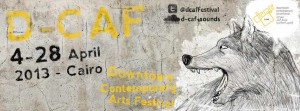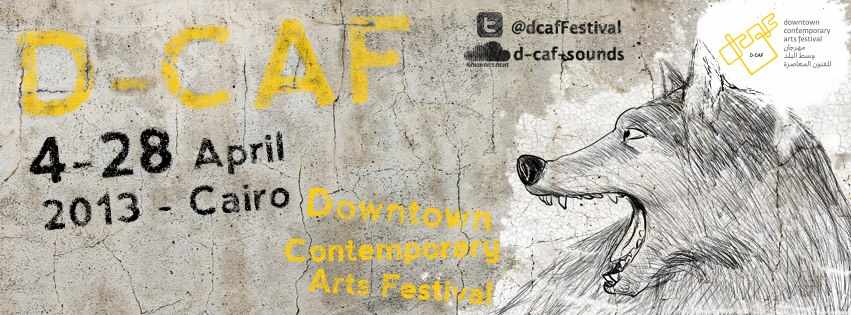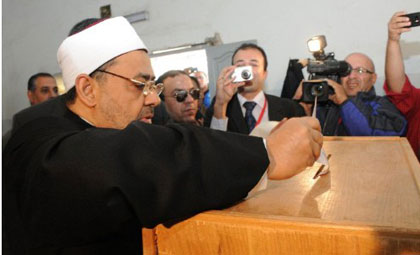
(Photo courtesy of D-CAF Facebook page)
El Attar is a busy man; he is a director, producer, play writer and art manager. In 2005 he founded Studio Emad Eddin (SEE), a large centre hosting rehearsal spaces in the heart of Downtown Cairo. “I realised there was a need for proper rehearsal spaces when I was preparing to stage a production in 2004. I had everything in place but there was nowhere to rehearse; we ended up doing that in my living room,” El Attar said. “It was a case of need being the basis of invention and so Studio Emad Eddin was born.” SEE opened its doors in 2005 and has several well-equipped rehearsal rooms. Last year 2,700 members used the rooms for a total of 18,000 hours.
El Attar is also the artistic director of D-CAF. He explained to us why he felt the need to start a contemporary arts festival in Cairo. “Seeing art is part of my development as a theatre practitioner, and the same goes for audiences,” he said. “Theatre here has been more or less the same in the last 10 years and is in the hands of a small group of people. There is so much happening abroad that I wanted Egyptian artists and audiences to see a well-curated and technically supported festival that would bring those performances here.”
When asked if he felt the Egyptian audiences are ready for how contemporary art has developed abroad El Attar said: “Yes, but they do not know it.”
“Audiences have lost the habit of paying for an artistic concept. Free art is directly linked to access to culture,” he said, explaining that those who arrange this free culture dictate what culture will be on offer. “Paying to see a performance is a contract between an artist and an audience, even if it is a symbolic fee,” El Attar said. “By buying a ticket, an audience member expresses the will to see the performance.”
D-CAF is curated based on clear artistic choices and El Attaran said the organisers learned a lot from the first festival, held last year. “We have a larger administrative team, the festival runs over more days, and the programming is more spacious. We also think the audience has learned along with us.”
The choice of location was never a question for El Attar. “Downtown is the natural place for a festival because it has the largest concentration of venues in Cairo.” When asked if he is worried about potential disturbances to the programme in the area of town that has often been the centre of political turmoil El Attar said: “Protests are one way to express yourself as an individual or a group and if there are clashes people may change their minds, but overall people are willing to move around and come and see performances.”
The subject made El Attar a little philosophical: “We have forgotten how to express ourselves; society needs to learn how to say things differently, there are many other ways. Part of staging the festival here is showing people that that is also possible in Downtown. A public space is also a space of celebration and exchange.”
El Attar used some simple ground rules while curating the festival. “The international acts need to fit with the main context, be contemporary, and have what we see as quality.” Providing inspiration is also an important idea for El Attar: “An artist evolves during his career; he or she starts in small venues and grows into bigger ones. Here everyone is on the same level. An art scene has to provide inspiration and therefore you cannot all be at the same stage.” He added that artists learn, grow and are inspired by those who are further along than they are.
The foreign artists participating in D-CAF are excited: “The artists are looking forward to performing their pieces for audiences that are new to them. It is also good for their careers; festival producers take note of who has performed where and this could get them more work.”
At the time of the interview the government had not yet given any support to D-CAF. “Last year we did receive a little help from the Foreign Ministry, but this year we have not heard anything yet. I believe the government should encourage local initiatives instead of only mainstream productions.”
When asked to name a few highlights in the programme El Attar said that all was worth seeing, but did offer a few recommendations from amongst the performing arts pieces:
Anatomia Publica, a contemporary dance performance by La Cie Man Drake from Spain/France, “because of the amazing technique and creativity”.
Alice, a site-specific theatre show by Sawsan Bou Khaled and Hussein Baydoun from Lebanon, “which will have its world premiere during the festival”.
The Great War, a live animation theatre show by Hotel Modern from the Netherlands, “because they are icons of contemporary theatre and even if the piece is 10 years old it is still valid”.
WHITE RABBIT RED RABBIT, a play by Iranian Nassim Soleimanpour, “which will destroy all your notions about theatre and will change your perceptions. It is creative, simple, effective; the true magic of theatre. This will be the first time it has been performed in Arabic”.
El Attar will consider D-CAF a success if audiences come and see the performances, screenings, and exhibitions, and participate in the workshops. “The core team has been working since September and since mid-February we have been up to full strength. It is all about planning and preparation; a festival’s reputation depends on the artistic product, what it represents and its artistic content. But it also depends on being able to present that product in the best possible way.”



